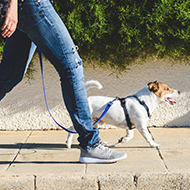
Researchers used “deep learning” technology to identify common conditions from activity monitors.
The first real-world study demonstrating the accuracy of pet behaviour and activity monitoring to detect disease has been published in the journal, Animals.
Researchers used “deep learning” technology to analyse and detect pet behaviours and activities associated with common canine diseases. It is hoped the technology could help owners identify pets with conditions such as poor appetite, excessive weight, or osteoarthritis.
The study was led by researchers from Kinship’s Pet Insight Project and the Waltham Petcare Science Institute.
“Deep learning is a powerful technology that enables us to analyze enormous amounts of data to identify meaningful patterns in pet behaviour,” explained study author Dr Aletha Carson. “With this research program, we used our data to build algorithms which allow us to objectively understand a pet’s behaviour in their home environment. A better understanding of day to day behaviours will allow us to identify potential signs of illnesses earlier than ever before and promote earlier treatment interventions.”
In the study, researchers assembled machine-learning training databases from more than 5,000 videos of more than 2,500 dogs, and 11 million days of pet activity data collected from pet activity monitors. They then created a novel deep-learning algorithm that can accurately group data from a collar-mounted sensor called an accelerometer into defined activities and behaviours.
Next, the team compared this data to real-world pet activity reports from owners of 10,550 dogs. They found that the algorithm correctly identified eating (94%) and drinking (98.8%), and could even spot more refined behaviour like sniffing and scratching.
“This paper validates the accuracy of using behavioural ‘signs’ to detect potential health issues, based on real-world data,” said Scott Lyle, head of Pet Insight Project. “With the foundational algorithms built on the dataset, we can further our understanding of pet behaviour with devices like Whistle™ in seeking to advance individualised veterinary care."



 FIVP has shared a survey, inviting those working in independent practice to share their views on the CMA's proposed remedies.
FIVP has shared a survey, inviting those working in independent practice to share their views on the CMA's proposed remedies.